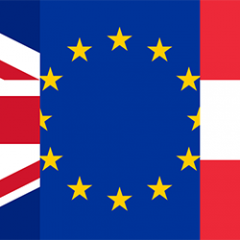I think you will spend 240 seconds reading this post
One of the very valid concerns that I registered from the previous post hearing the views of a pro-Brexit Briton in Vienna was the concern that a close result will not put the issue of Britain’s EU membership beyond incontrovertible doubt. The poster made the very valid point that a wafer-thin margin in favour of Bremain will not mean the end of the issue – and than after another General Election, there is likely to be another referendum held on the issue of the UK’s EU membership.When I started this blog, I had thought that the Austrian Presidential election would be long done and dusted, and the last four weeks, between the initial round (where the five/six candidates – depending on whether you call Richard Lugner a genuine candidate or not – contested a ballot, with the top two being in the run-off), and Sunday’s run-off (and Sunday and Monday’s pontificating, non-analysis and borderline confusion as the websites of all the major news providers caved in under the clamour to find out the final result) seeming like an eternity – with wall-to-wall coverage on state broadcaster ORF and the occasional “excursion” to ATV. The head-to-head confrontations between Hofer and Van der Bellen were not pretty – they verged on the ugly – particularly the ATV one last week.
In the end, Hofer was ahead after all physical votes were counted. “Hochrechnungen” were performed that said it was going to be very close – with Van der Bellen likely to prevail based on an increased number of postal votes, which were only going to be counted on Monday. These postal votes indeed proved decisive, as the tables with the final results below show.
Granted ORF did ultimately get it right in terms of calling it successfully that Hofer would have the most physical votes, but Van der Bellen would overtake him with the help of the postal votes, which were counted on Monday, but the coverage spent far too much time (i.e. the whole of Sunday evening with pseudo-analysis programming) – and giving airtime to far too many past-it politicians. Notably both government coalition partners refused to send someone to the ORF Studio to comment – they would have been better served, rather than sending in any of their superannuated fuddy-duddies, to have sent in a young star from the party to advise that the entire coverage was based on predictions and forecasts – rather than a result, and to leave. However, the absence of Waldorf and Statler from the SPÖ and ÖVP was just a sign of how out of touch the enduring grand coalition is.
I personally would have given ORF far greater credit for having had the nerve to have shown The Great Escape in place of all the wall-to-wall rent-a-quote jobsworths – sadly the hamster-powered wheels that turn slowly at the Küniglberg are unable to do something that tongue-in-cheek and visionary. In the land of the blind, pedestrian election coverage is king.
Table 1: Final Result
| Candidate | Percentage of Votes Received | Absolute Votes |
|---|---|---|
| Hofer | 49.65 % | |
| Van der Bellen | 50.35 % |
| Run-off | |
|---|---|
| Turn out: | 72,75 % |
| Eligible votes: | 6,382,507 |
| Votes cast: | 4,643,154 |
| Valid votes cast: | |
| Spoilt votes: |
Source:ORF Website; translation: author
Table 2: Voting excluding postal votes (“Wahlkarten”)
| Candidate | Percentage of Votes Received | Absolute Votes |
|---|---|---|
| Hofer | 51.9% | |
| Van der Bellen | 48.1 % |
Source: www.bundespraesidentschaftswahl.at
There were unhelpful headlines from the international press – one British paper proclaiming that Austria had “rejected the far right”. A very close victory for Van der Bellen hardly counts as rejecting the far right. The FPÖ’s support is not going to be instantly diluted or melt away. Between the first vote, where Hofer picked up approx 35% (leading the six candidate field) and the run-off where he picked up 49.65% (coming a very close second), he still managed to gain support from the voters who had voted for other candidates, albeit at a lesser rate than Van der Bellen.
Like the point made at the start of this article, this wafer-thin win for Van der Bellen does not solve the issue of the popularity of the FPÖ in Austria. A wafer-thin “Bremain” will be similar – if anything the debate will be stoked more and further consideration of the issue of EU Membership will be fuelled by a slender victory for remaining in.
To really put the topic to bed a decisive margin in favour of Bremain will be required – anything short of close to 60% will only fan the flames, despite the decision to stay in.
Last but not least, I hope that the websites of the major news providers in the UK will be better prepared than their Austrian counterparts. At 4pm, around the time on Monday when the final result was to be declared, more or less all major new websites struggled to handle the traffic – in the BBC we trust…
